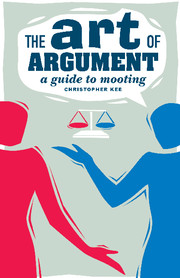Book contents
- Frontmatter
- Contents
- Preface
- Acknowledgments
- Part 1 Making the most of a moot
- 1 Introduction
- 2 You've made the team – what next?
- 3 Being part of a team
- 4 Building an argument
- 5 Written documents
- 6 Oral submissions
- 7 Practice moots
- 8 The competition itself
- 9 After it's all over
- Part 2 References and resources
- Part 3 International moots
- Index
7 - Practice moots
Published online by Cambridge University Press: 05 June 2012
- Frontmatter
- Contents
- Preface
- Acknowledgments
- Part 1 Making the most of a moot
- 1 Introduction
- 2 You've made the team – what next?
- 3 Being part of a team
- 4 Building an argument
- 5 Written documents
- 6 Oral submissions
- 7 Practice moots
- 8 The competition itself
- 9 After it's all over
- Part 2 References and resources
- Part 3 International moots
- Index
Summary
The value of participating in practice moots cannot be underestimated. The more familiar you become with the experience of standing before an audience presenting a submission, the more relaxed you will be when it comes to appearing in the moot competition. As we have discussed, relaxation, preparation and practice are the keys to performing at your best.
Elite athletes not only undergo intensive physical training, they often engage sports psychologists. A sports psychologist can help an athlete visualise various scenarios that might occur during a race, for example. By thinking through these scenarios, the athlete is prepared and will know what to do if any of the situations arise. While moot participants would rarely if ever call upon a psychologist, there are similarities in our preparation techniques. However, we have one considerable advantage over the athletes – we can actually experience the scenarios during practice moots, rather than just imagining them.
When establishing your program of practice moots, you should do so in a manner that exposes you to the greatest diversity of circumstances that might occur in the actual moot.
WHEN TO START DOING PRACTICE MOOTS
You should begin practice moots as early as possible in the process of preparing for the competition. This is particularly important if you have little or no previous mooting experience. If you begin to articulate your arguments in the face of questioning, this will help you develop those arguments during the written stage as well.
- Type
- Chapter
- Information
- The Art of ArgumentA Guide to Mooting, pp. 94 - 99Publisher: Cambridge University PressPrint publication year: 2007



